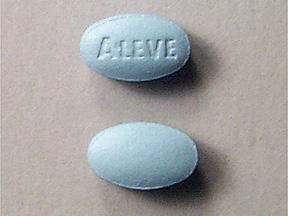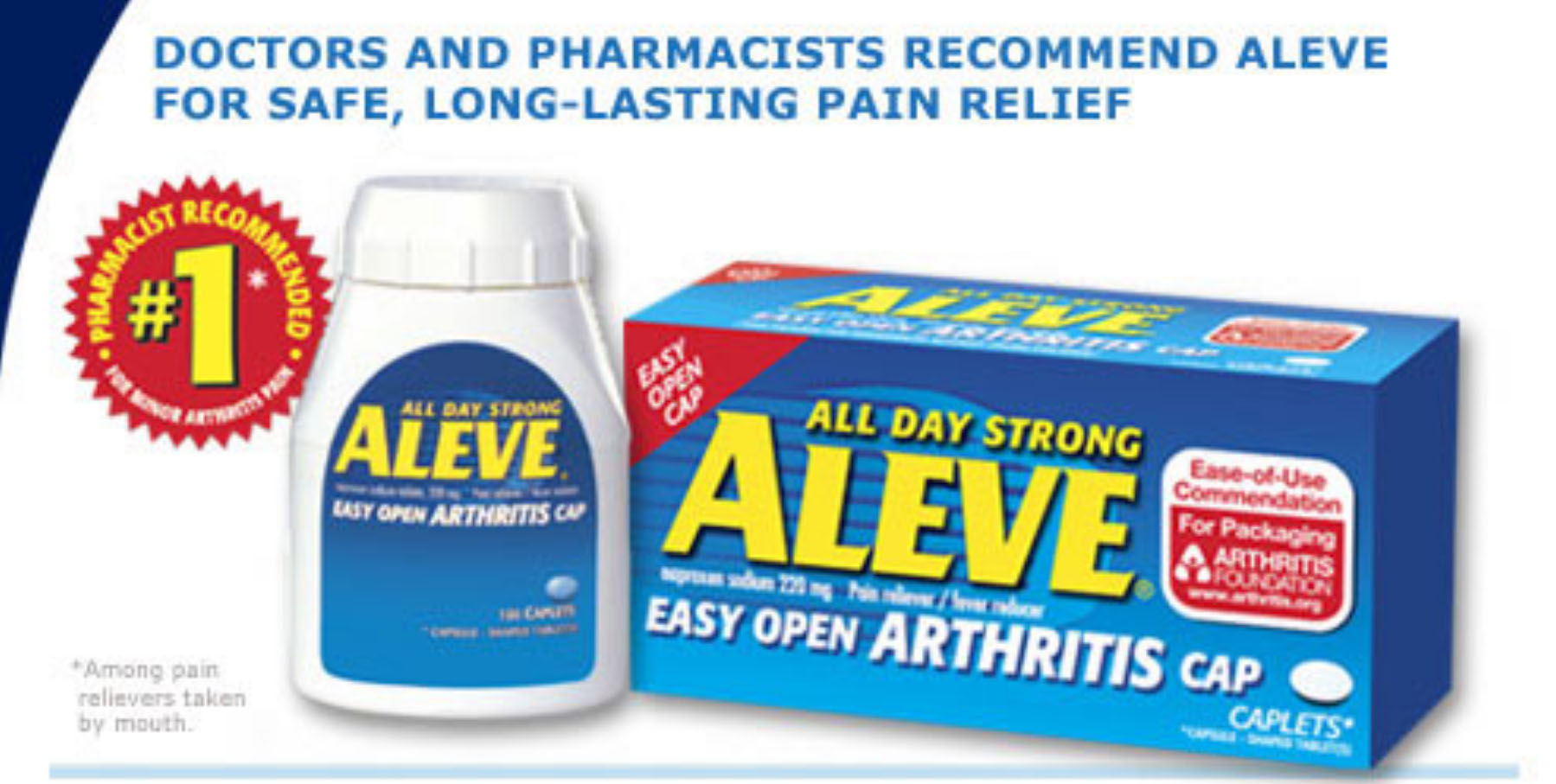What is Aleve?
Aleve (naproxen) is a nonsteroidal anti-inflammatory drug (NSAID). Naproxen works by reducing hormones that cause inflammation and pain in the body.
Aleve is used to temporarily relieve minor aches and pains due to arthritis, muscular aches, backache, menstrual cramps, headache, toothache,and the common cold. Aleve is also used to temporarily reduce fever.
Aleve may also be used for purposes not listed in this medication guide.
Important information


You should not use Aleve if you have a history of allergic reaction to aspirin or other NSAID (nonsteroidal anti-inflammatory drug).
Aleve can increase your risk of fatal heart attack or stroke, especially if you use it long term or take high doses, or if you have heart disease. Do not use Aleve just before or after heart bypass surgery (coronary artery bypass graft, or CABG).
Get emergency medical help if you have chest pain, weakness, shortness of breath, slurred speech, or problems with vision or balance.
Aleve may also cause stomach or intestinal bleeding, which can be fatal. These conditions can occur without warning while you are using Aleve, especially in older adults.
Before Taking Aleve
Aleve can increase your risk of fatal heart attack or stroke, especially if you use it long term or take high doses, or if you have heart disease. Even people without heart disease or risk factors could have a stroke or heart attack while taking this medicine.
Do not use this medicine just before or after heart bypass surgery (coronary artery bypass graft, or CABG).
Aleve may also cause stomach or intestinal bleeding, which can be fatal. These conditions can occur without warning while you are using naproxen, especially in older adults.
You should not use Aleve if you are allergic to naproxen, or if you have ever had an asthma attack or severe allergic reaction after taking aspirin or an NSAID.
Ask a doctor or pharmacist if it is safe for you to use this medicine if you have:
- heart disease, high blood pressure, high cholesterol, diabetes, or if you smoke;
- a history of heart attack, stroke, or blood clot;
- a history of stomach ulcers or bleeding;
- asthma;
- liver or kidney disease; or
- fluid retention.
Taking Aleve during the last 3 months of pregnancy may harm the unborn baby. Do not use this medicine without a doctor’s advice if you are pregnant.
Naproxen can pass into breast milk and may harm a nursing baby. You should not breast-feed while using this medicine.
Do not give Aleve to a child without medical advice.
The Mechanism of Aleve
Aleve (naproxen) is a nonsteroidal anti-inflammatory drug (NSAID). Its primary mechanism of action is the inhibition of cyclooxygenase (COX) enzymes, which are involved in the production of substances that cause inflammation, pain, and fever.
Here’s a breakdown of how it works:
1. Inhibition of Cyclooxygenase (COX) Enzymes
-
There are two main types of COX enzymes:
-
COX-1: Helps maintain normal functions like protecting the stomach lining and supporting kidney function.
-
COX-2: Primarily involved in the inflammation process.
-
-
Naproxen inhibits both COX-1 and COX-2 (non-selective inhibition).
-
By blocking these enzymes, naproxen reduces the formation of prostaglandins — chemical messengers that promote inflammation, pain, and fever.
-
2. Resulting Effects
-
Anti-inflammatory: Reduces swelling and redness by lowering prostaglandin levels at the site of injury or irritation.
-
Analgesic (pain relief): Decreases the sensation of pain caused by inflammation or injury.
-
Antipyretic (fever reduction): Helps lower body temperature when it’s elevated due to infection or illness.
3. Downside of COX-1 Inhibition
-
While inhibiting COX-2 provides relief, blocking COX-1 can lead to side effects like:
-
Stomach irritation and ulcers
-
Reduced kidney function
-
Increased risk of bleeding (due to platelet inhibition)
-
This is why long-term or high-dose use of naproxen should be monitored, especially in people with preexisting gastrointestinal, kidney, or cardiovascular issues.
How should I take Aleve?
Use Aleve exactly as directed on the label, or as prescribed by your doctor. Do not use in larger or smaller amounts or for longer than recommended. The smallest effective dose should be used.
Dosage for adults and children 12 years and older: Take 1 Aleve capsule or tablet every 8 to 12 hours while symptoms last. For the first dose you may take 2 capsules or tablets within the first hour. Do not exceed 2 capsules or tablets in any 8 to 12 hour period – do not exceed 3 capsules or tablets in a 24-hour period.
Drink a full glass of water with each dose. If taken with food, Aleve may take longer to work.
Store Aleve at room temperature away from moisture and heat.
Read all patient information, medication guides, and instruction sheets provided to you. Ask your doctor or pharmacist if you have any questions.
What happens if I miss a dose?
Since Aleve is sometimes used only when needed, you may not be on a dosing schedule. If you are on a schedule, use the missed dose as soon as you remember. Skip the missed dose if it is almost time for your next scheduled dose. Do not use extra medicine to make up the missed dose.
What happens if I overdose?
Seek emergency medical attention or call the Poison Help line at 1-800-222-1222.
What should I avoid while taking Aleve?
Avoid drinking alcohol. It may increase your risk of stomach bleeding.
Avoid taking aspirin while you are taking Aleve.
Ask a doctor or pharmacist before using any cold, allergy, or pain medicine. Many medicines available over the counter contain aspirin or other medicines similar to naproxen. Taking certain products together can cause you to get too much of this type of medication. Check the label to see if a medicine contains aspirin, ibuprofen, ketoprofen, or naproxen.
Ask your doctor before using an antacid, and use only the type your doctor recommends. Some antacids can make it harder for your body to absorb Aleve.
Aleve Side Effects
Aleve is a brand name for naproxen, a nonsteroidal anti-inflammatory drug (NSAID) commonly used to relieve pain, inflammation, and fever. While it’s generally safe for short-term use, it can cause side effects, especially with long-term use or in higher doses.
Common Side Effects
These are usually mild and may go away on their own:
Serious Side Effects
These require immediate medical attention:
- Gastrointestinal issues: Stomach ulcers, bleeding, or perforation (can present as black or bloody stools, vomiting blood, or severe abdominal pain)
- Cardiovascular risks: Increased risk of heart attack or stroke, especially with long-term use or in those with pre-existing heart conditions
- Kidney problems: Decreased urine output, swelling in legs/feet, unusual fatigue
- Liver problems: Yellowing of skin or eyes (jaundice), dark urine, severe fatigue
- Allergic reactions: Rash, itching/swelling (especially of the face/tongue/throat), severe dizziness, trouble breathing
Special Considerations
- Not recommended during late pregnancy
- Use caution in people with asthma, heart disease, high blood pressure, or kidney/liver problems
- Should not be combined with other NSAIDs or blood thinners (like warfarin) without medical advice
What Other Drugs Will Affect Aleve?
Several drugs can interact with Aleve (naproxen) and either increase the risk of side effects or reduce its effectiveness. Here’s a breakdown of the main types of drugs that may affect or be affected by naproxen:
1. Other NSAIDs (Non-Steroidal Anti-Inflammatory Drugs)
Examples: Ibuprofen, aspirin, diclofenac, ketoprofen, celecoxib
Effect: Increased risk of gastrointestinal bleeding, ulcers, and kidney damage.
Mechanism: Combined inhibition of prostaglandin synthesis, which protects the stomach lining and maintains kidney function.
2. Anticoagulants and Antiplatelet Drugs
Examples: Warfarin, heparin, apixaban (Eliquis), rivaroxaban (Xarelto), clopidogrel (Plavix)
Effect: Increased risk of serious bleeding, including internal bleeding.
Mechanism: Naproxen’s inhibition of platelet function combined with anticoagulant effects increases bleeding risk.
3. Corticosteroids
Examples: Prednisone, dexamethasone
Effect: Higher risk of stomach ulcers and GI bleeding.
Mechanism: Both drugs independently thin the stomach lining, and the effect is amplified when used together.
4. Selective Serotonin Reuptake Inhibitors (SSRIs) and Serotonin-Norepinephrine Reuptake Inhibitors (SNRIs)
Examples: Fluoxetine, sertraline, escitalopram, venlafaxine, duloxetine
Effect: Increased risk of GI bleeding.
Mechanism: SSRIs/SNRIs reduce platelet aggregation by lowering serotonin uptake, and naproxen inhibits platelet function.
5. Diuretics (Water Pills)
Examples: Furosemide, hydrochlorothiazide
Effect: Reduced diuretic effectiveness and increased risk of kidney issues.
Mechanism: NSAIDs can reduce renal blood flow and counteract the effects of diuretics.
6. ACE Inhibitors and ARBs
Examples: Lisinopril, enalapril, losartan, valsartan
Effect: Increased risk of kidney damage and hyperkalemia (high potassium levels).
Mechanism: NSAIDs reduce renal perfusion, and in combination with these drugs, may impair kidney function.
7. Lithium
Effect: Increased lithium levels in the blood, potentially leading to toxicity.
Mechanism: Naproxen reduces renal clearance of lithium.
8. Methotrexate
Effect: Increased risk of methotrexate toxicity (e.g., liver damage, bone marrow suppression).
Mechanism: Naproxen reduces renal excretion of methotrexate.
9. Cyclosporine and Tacrolimus
Effect: Increased risk of kidney toxicity.
Mechanism: NSAIDs may amplify nephrotoxic effects of these immunosuppressants.
10. Digoxin
Effect: Increased blood levels of digoxin.
Mechanism: Naproxen may reduce renal clearance of digoxin.
11. Alcohol
Effect: Higher risk of gastrointestinal bleeding and liver stress.
Mechanism: Alcohol and naproxen both irritate the stomach lining and strain liver function.
12. Probenecid
Effect: Increased naproxen levels.
Mechanism: Probenecid inhibits the renal excretion of naproxen.
13. Antihypertensives (especially beta-blockers and diuretics)
Examples: Metoprolol, atenolol
Effect: Reduced effectiveness in lowering blood pressure.
Mechanism: NSAIDs may cause sodium retention and vasoconstriction, counteracting antihypertensive effects.
